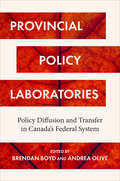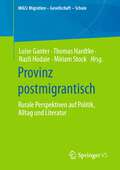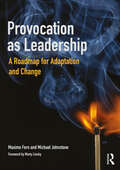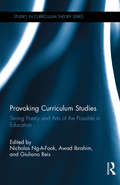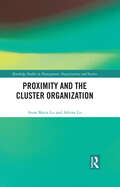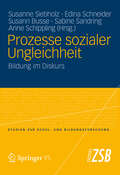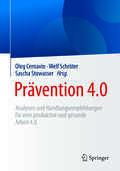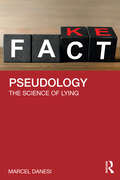- Table View
- List View
Providing Integrated Health and Social Services for Older Persons: A European Overview of Issues at Stake (Routledge Revivals)
by Andy M. AlaszewskiOriginally published in 2004. Providing Integrated Health and Social Care for Older Persons - Issues, Problems and Solutions (PROCARE)" is a project in the EU Fifth Framework Programme (Quality of Life and Management of Living Resources, Area "The Ageing Population and Disabilities") that aims to help in defining the new concept of an integrated health and social care for older persons in need of care by comparing and evaluating different modes of care delivery. The project will identify structural, organisational, economic and social-cultural factors and actors that constitute an integrated and sustainable care system with enhanced outcomes for all actors involved. This book gathers the achievements of the first project phase (2002) that consisted in a literature overview focusing on the question which of the variety of innovations in modes of organisation, finance and professional collaboration observed in Europe over the last decade have been the most successful and long-lasting ones. Thus, national reports from nine EU Member States (Austria, Denmark, Finland, France, Germany, Greece, Italy, the Netherlands and the UK) will be presented by scholars from leading research and consulting agencies in these countries. The national reports follow a mutually agreed structure. The publication is introduced by a general overview and a more theoretic article defining the issues at stake. The book gives a unique general overview on European approaches towards integrated social and health care services and policies that are to be developed to face the growing need of care in ageing societies; furthermore, it provides indicators for successful approaches and models of good practice to overcome the "social-health-divide" and a better understanding of the meaning of integrated services and coordination of social and health systems in the different countries. Finally, facts and figures about coordination at the interface between health and social care for older persons as well as problems and solutions (
Provincial Policy Laboratories: Policy Diffusion and Transfer in Canada’s Federal System
by Brendan Boyd and Andrea OliveCanada's federal system, composed of ten provincial governments and three territories, all with varying economies and political cultures, is often blamed for the country's failure to develop coordinated policy responses to key issues. But in other federal and multi-level governance systems, the ability of multiple governments to test a variety of policy responses has been lauded as an effective way to build local and national policy. Despite high-profile examples of policy diffusion in Canada, there has been surprisingly little academic study of policy learning and diffusion among provinces. Featuring cutting-edge research, Provincial Policy Laboratories explores the cross-jurisdictional movement of policies among governments in Canada’s federal system. The book comprises case studies from a range of emerging policy areas, including parentage rights, hydraulic fracturing regulations, species at risk legislation, sales and aviation taxation, and marijuana regulation. Throughout, the contributors aim to increase knowledge about this understudied aspect of Canadian federalism and contribute to the practice of intergovernmental policymaking across the country.
Provincials: Postcards from the Peripheries
by Sumana RoyAn enchanting and joyous exploration of life and creativity at the geographical edges of the modern world Who is a provincial? In this subversive book, Sumana Roy assembles a striking cast of writers, artists, filmmakers, cricketers, tourist guides, English teachers, lovers and letter writers, private tutors and secret-keepers whose lives and work provide varied answers to that question. Combining memoir with the literary, sensory, and emotional history of an ignored people, she challenges the metropolitan&’s dominance to reclaim the joyous dignity of provincial life, its tics and taunts, enthusiasms and tragicomedies. In a wide-ranging series of &“postcards&” from the peripheries of India, Europe, America, and the Middle East, Roy brings us deep into the imaginative world of those who have carried their provinciality like a birthmark. Ranging from Rabindranath Tagore to William Shakespeare, John Clare to the Bhakti poets, T. S. Eliot to J. M. Coetzee, V. S. Naipaul to the Brontës, and Kishore Kumar to Annie Ernaux, she celebrates the provincials&’ humor and hilarity, playfulness and irony, belatedness and instinct for carefree accidents and freedom. Her unprecedented account of provincial life offers an alternative portrait of our modern world.
Proving Ground: Expertise and Appalachian Landscapes
by Edward SlavishakDisrupting the intervenor narrative in Appalachian studies.The Appalachian Mountains attracted an endless stream of visitors in the twentieth century, each bearing visions of what they would encounter. Well before large numbers of tourists took to the mountains in the latter half of the century, however, networks of missionaries, sociologists, folklorists, doctors, artists, and conservationists made Appalachia their primary site for fieldwork. In Proving Ground, Edward Slavishak studies several of these interlopers to show that the travelers’ tales were the foundation of powerful forms of insider knowledge. Following four individuals and one cohort as they climbed professional ladders via the Appalachian Mountains, Slavishak argues that these visitors represented occupational and recreational groups that used Appalachia to gain precious expertise. Time spent in the mountains, in the guise of work (or play that mimicked work), distinguished travelers as master problem-solvers and transformed Appalachia into a proving ground for preservationists, planners, hikers, anthropologists, and photographers.Based on archival materials from outdoors clubs, trade journals, field notes, correspondence, National Park Service records, civic promotional materials, and photographs, Proving Ground presents mountain landscapes as a fluid combination of embodied sensation, narrative fantasy, and class privilege. Touching on critical regionalism and mobility studies, this book is a boundary-pushing cultural history of expertise, an environmental history of the Appalachian Mountains, and a historical geography of spaces and places in the twentieth century.
Provinz postmigrantisch: Rurale Perspektiven auf Politik, Alltag und Literatur (MiGS: Migration - Gesellschaft - Schule)
by Miriam Stock Nazli Hodaie Luise Ganter Thomas HardtkeDer Band entwickelt eine postmigrantische Perspektive auf provinzielle oder provinzbezogene Kontexte und Positionierungen und vereinigt dabei literarische Perspektiven mit empirischen Zugängen zu Politik und Alltag. Es werden postmigrantische Aushandlungen in ruralen Kontexten in den Blick genommen und zudem gefragt, wie sich Vorstellungen zur „Provinz“ wie auch zur „Migration“ gegenseitig bedingen, neuformieren und wo dies konkret geschieht.
Provocation as Leadership: A Roadmap for Adaptation and Change
by Maxime Fern Michael JohnstoneTo create deep change, you have to disturb people, or at least risk doing so. Shaking people out of their comfort zones not only generates the possibility of change but also elicits new information and brings out hidden resources that people need to navigate unfamiliar waters. Nevertheless, provoking without antagonizing or shutting people down and tolerating their pushback are complex challenges, requiring skill and will. This is the first comprehensive provocation roadmap: why provocation is necessary for effectively leading change, the different forms of provocation, action tools and frameworks, and case studies illustrating how change is achieved through the sustained and careful use of provocation and disturbance, with strategies and tactics for minimizing the risks involved. We illustrate, for example, how two Australian farmers challenged centuries-old farming practice to regenerate their properties and how a large American bank used the death of a revered CEO to reinvigorate the business. We show how a young indigenous school principal tackled entrenched attitudes to turn a failing school around and how a national statistical service acted like a technology start-up to innovate during the Covid-19 pandemic. The case studies address change at the local level, within organizations, as well as on a national scale. We finish with a synthesis of the lessons learned and a set of ideas about building people’s capacity to use provocation to live, learn, and thrive. Provocation as Leadership offers a blueprint for people who, using provocation, want to ignite change and help their organizations, group, or community break through to a better future. This book provides a vehicle to see provocation in its potential for necessary disturbance, to lay bare its anatomy, and give access to its possibilities, including how to enable provocateurs to live another day.
Provocative Plastics: Their Value in Design and Material Culture
by Susan LambertPlastics have now been our most used materials for over fifty years. This book adopts a new approach, exploring plastics’ contribution from two perspectives: as a medium for making and their value in societal use. The first approach examines the multivalent nature of plastics materiality and their impact on creativity through the work of artists, designers and manufacturers. The second perspective explores attitudes to plastics and the different value systems applied to them through current research undertaken by design, materials and socio-cultural historians. The book addresses the environmental impact of plastics and elucidates the ways in which they can and must be part of the solution. The individual viewpoints are provocative and controversial but together they present a balanced and scholarly un-picking of the debate that surrounds this ubiquitous group of materials. The book is essential reading for a wide academic readership interested in the Arts and Humanities, especially Design and Design History; Anthropology; and Cultural, Material and Social Histories.
Provoking Curriculum Studies: Strong Poetry and Arts of the Possible in Education (Studies in Curriculum Theory Series)
by Nicholas Ng-A-Fook, Awad Ibrahim and Giuliano ReisProvoking Curriculum Studies pushes forward a strong reading of the theoretical and methodological innovations taking place within curriculum studies research. Addressing an important gap in contemporary curriculum studies—conceptualizing scholars as poets and the potential of the poetic in education—it offers a framework for doing curriculum work at the intersection of the arts, social theory, and curriculum studies. Drawing on poetic inquiry, psychoanalysis, phenomenology, life writing, and several types of arts-based research methodologies, this diverse collection spotlights the intellectual genealogies of curriculum scholars such as Ted Aoki, Geoffrey Milburn and Roger Simon, whose provocations, inquiries, and recursive questioning link the writing and re-writing of curriculum theory to acts of strong poetry. Readers are urged to imagine alternative ways in which professors, teachers, and university students might not only engage with but disrupt, blur, and complicate curriculum theory across interdisciplinary topographies in order to seek out blind impresses—those areas of knowledge that are left over, unaddressed by ‘mainstream’ curriculum scholarship, and that instigate difficult questions about death, trauma, prejudice, poverty, colonization, and more.
Proximity and the Cluster Organization (Routledge Studies in Management, Organizations and Society)
by Anna Maria Lis Adrian LisIncluding the category of proximity in theoretical considerations and empirical analyzes in cluster organizations is an attempt to integrate existing approaches to understand and explain the specificity of inter-organizational cooperation developed in geographical proximity. The importance of geographical proximity to create a competitive advantage is emphasized in all theories on the establishment and development of industrial clusters. However, proximity should not be perceived only in the geographical dimension. The similarity of knowledge systems (cognitive proximity), relationships based on trust (social proximity), organizational links (organizational proximity), and finally the similarity of institutional operating conditions (institutional proximity) enable and facilitate the development of cooperation relationships between business entities. Each of the above-mentioned threads deals separately with issues that have much in common, namely they can be treated as different dimensions of the same concept – proximity. Proximity provides a specific concretization of the features, processes and mechanisms underlying inter-organizational cooperation, and thus facilitates its understanding, increasing the possibility of its effective management. The study provides new important elements to the current system of knowledge, filling in the cognitive and research gaps in the scientific literature on problems related to proximity development in cluster organizations. The new element includes a multidimensional concept of proximity explaining its role in the development of cooperative relationships in the cluster organizations. A strong point of the developed concept is its inductive-abductive origin and the use of grounded theory methodology, which is rare in the studies of cluster organizations. The developed concept has also significant practical advantages since it allows to consciously shape proximity in COs, thus contributing to the development of cooperation between cluster enterprises.
Prozesse sozialer Ungleichheit
by Susanne Siebholz Sabine Sandring Anne Schippling Susann Busse Edina SchneiderIn welcher Weise und bedingt durch welche Faktoren ergeben sich Zusammenhänge und Verbindungen zwischen Bildung und der (Re-)Produktion sozialer Ungleichheit? In vier thematischen Blöcken werden in diesem Band jüngste empirische Forschungsergebnisse vorgestellt und praktische Konsequenzen diskutiert. Schwerpunktmäßig werden Prozesse, Bildungsorte und Diskurse in den Blick genommen und Übergänge im Bildungssystem, unterschiedliche Bildungsinstitutionen sowie Aspekte von Migration thematisiert. Auch theoretische Debatten etwa um das Konzept der Intersektionalität werden aufgenommen. Insgesamt entsteht eine multiperspektivistische Sicht auf die Problematik von Bildung und sozialer Ungleichheit.
Prozesstheorie und Soziale Arbeit: Typologische und praktische Aspekte ihres relationalen Werdens
by Werner SchönigAuch wenn oftmals von Prozessen gesprochen wird, so bleibt doch in der Regel unklar, was ein Prozess eigentlich ist und was die Prozessperspektive theoretisch und praktisch bedeutet. Dies gilt auch und besonders für die Soziale Arbeit. Zu dieser Frage skizziert das Buch zunächst die wichtigsten Prämissen und Beiträge der Prozesstheorie, beginnend bei den Klassikern der Prozessphilosophie und dann übergehend zu den zentralen Autoren Rescher (1996) und Abbott (2020). Sie gehen davon aus, dass die Welt ontologisch eine ständige Veränderung von Relationen und ein Werden ist, so dass Phasen der Ruhe und Statik erstens selten und zweitens nur transitorisch sind.
Prude: How the Sex-Obsessed Culture Damages Girls (and America, Too!)
by Carol Platt LiebauPolitical analyst and commentator Carol Platt Liebau takes a hard look at the pervasiveness of sex in today's culture and the havoc it wreaks on young people.
Przywództwo z Synercube: Dynamiczna kultura przywództwa w dążeniu do doskonałości
by Anatoly Zankovsky Christiane von der HeidenOpis teorii przywództwa Synercube z praktycznymi przykładami. W książce omówionych zostało 10 stylów przywódczych opartych na trzech wymiarach: ludzie, zadania i wartości. Czytelnik ma okazję poznać różne rodzaje interakcji zachodzących w środowisku organi-zacji oraz dowiedzieć się, jak dzięki sile organizacji i za pomocą dostępnych zasobów uzyskiwać doskonałe wyniki, budując tym samym trwałą kulturę organizacyjną. Teoria Sy-nercube jest przewodnikiem na drodze do zmian. Model Synercube odnosi się do szeregu efektów psychologicznych oraz behawioralnych. Wprowadzanie zmian w oparciu o model Synercube staje się skuteczne, a efekty trwałe. Menadżerowie zarówno małych, jak i dużych organizacji z pewnością skorzystają na lekturze tej książki.
Prähistorische Anthropologie: Eine Standortbestimmung (essentials)
by Bernd HerrmannBernd Herrmann erläutert die Grundlagen der Prähistorischen Anthropologie. Grundsätzliches Thema dieses Forschungsgebietes ist die Untersuchung körperlicher Überreste von Menschen historischer Zeiträume mit dem Ziel der Aufdeckung ihrer Lebensumstände. Damit werden Kenntnisse über Menschen vor allem der Nacheiszeit gewonnen, die Rekonstruktion von Einflüssen auf ihr Leben wird ermöglicht.
Präsentieren in Wissenschaft und Forschung: In Präsenz und virtuell
by Barbara HeyDer Vortrag ist für Forscher die Visitenkarte. Er bietet die Möglichkeit, Forschungsergebnisse, Arbeitsweise und sich selbst einem größeren Publikum vorzustellen. Im Wettbewerb um Noten, Stellen und Forschungsgelder reicht inhaltliche Exzellenz allein nicht aus, auch die Form muss stimmen. Das Buch geht auf die Bedürfnisse von Wissenschaftlern ein und vermittelt anschaulich, worauf in den einzelnen Phasen eines Vortrags zu achten ist. Mit diesen Hilfestellungen lassen sich ein eigener Vortragsstil, persönliche Sicherheit und Souveränität entwickeln.
Präsentismus
by Daniela Lohaus Wolfgang HabermannIst Präsentismus eines der teuersten und gefährlichsten Phänomene der Weltwirtschaft? Das Buch bietet erstmalig eine umfassende und strukturierte Darstellung von Präsentismus und erspart so mühevolle Recherchearbeit in verstreuten Publikationen. Wissenschaftlich Interessierte, Personalverantwortliche und Studierende profitieren von einer verständlichen Zusammenfassung der wichtigsten Forschungsergebnisse aus unterschiedlichen Kulturkreisen und für diverse Berufsgruppen. Die Autoren haben aus diesen Ergebnissen ein entscheidungsintegriertes Modell entwickelt, das erklärt, unter welchen Bedingungen es zu Präsentismus kommt.Sie erfahren, wie Präsentismus erfasst wird und wie die monetären und immateriellen Kosten eingegrenzt werden können. Lernen Sie, wie verbreitet Präsentismus ist, was Mitarbeiter dazu motiviert, welche Vorteile mit diesem Verhalten verbunden sein können und dass dafür Belastungen und Konsequenzen in Kauf genommen werden.Dazu bekommen Sie einen Überblick über Maßnahmen des Betrieblichen Gesundheitsmanagements (BGM) zur gesundheitlichen Prävention und zur Bekämpfung erkrankungsbedingter Beschwerden von Beschäftigten als Ursachen von Präsentismus und Absentismus. Das Buch ist für alle Fach- und Führungskräfte wie auch für Betriebsräte und präventiv tätige Professionals bestens geeignet.
Prävention 4.0: Analysen und Handlungsempfehlungen für eine produktive und gesunde Arbeit 4.0
by Oleg Cernavin Welf Schröter Sascha StowasserZiel des Buches ist es, Handlungsoptionen von menschengerechter Arbeitsgestaltung in der digitalen Transformation zu identifizieren. Um die Potenziale zu nutzen und die Arbeitsbedingungen im Zuge der Integration smarter Technologien in Arbeitsprozessen gesundheitsgerecht und produktiv zu gestalten, müssen alle Akteure sensibilisiert und handlungsfähig sein. Das Buch enthält zahlreiche Beispiele und praxisnahe Empfehlungen zur menschengerechten Gestaltung der intelligenten Vernetzung von Mensch, Maschine und Organisation.
Prävention von Extremismus, Radikalisierung und Terrorismus: Grundlagen, internationale Praxis und Evaluation von psychosozialen Programmen
by Friedrich Lösel Irina Jugl-Kuntzsch Sonja King Doris BenderPolitisch, religiös, ethnisch oder anders motivierter Extremismus und gewaltorientierte Radikalisierung sind gravierende Probleme. Es gibt viele Aktivitäten zur Prävention, über deren Wirksamkeit man aber zu wenig weiß. Die Autoren berichten über ihre Forschungen zu protektiven Faktoren gegen Extremismus, Praxisprojekten aus 31 Ländern und zur Evaluation von psychosozialen Präventionsprogrammen. Grundbegriffe, Theorien, Methodenprobleme und Risikofaktoren werden erörtert. Es zeigen sich etliche ermutigende Ergebnisse, vor allem in der primären Prävention bei jungen Menschen sowie in tertiären Ansätzen zum Ausstieg. Positive Effekte bestehen bei kurzfristigen Änderungen in Einstellungen und Denkmustern. Deutlich wird aber, dass mehr kontrollierte Evaluationen zu langfristigen Effekten im Verhalten nötig sind. Abschließend werden Vorschläge für die Forschung, Politik und Praxis gemacht. Durch seine empirische Orientierung liefert der Band Grundlagen für eine sachliche und weniger „spalterische&“ Diskussion der Thematik.
Pseudo-Public Spaces in Chinese Shopping Malls: Rise, Publicness and Consequences (Routledge Complex Real Property Rights Series)
by Yiming WangShopping malls in China create a new pseudo-public urban space which is under the control of private or quasi-public power structure. As they are open for public use, mediated by the co-mingling of private property rights and public meanings of urban space, the rise, publicness and consequences of the boom in the construction of shopping malls raises major questions in spatial political economy and magnifies existing theoretical debates between the natural and conventional schools of property rights. In examining these issues this book develops a theoretical framework starting with a critique of the socio-spatial debate between two influential bodies of work represented by the work of Henri Lefebvre and David Harvey. Drawing on the framework, the book examines why pseudo-public spaces have been growing so rapidly in China since the 1980s; assesses to what degree pseudo-public spaces are public, and how they affect the publicness of Chinese cities; and explores the consequences of their rise. Findings of this book provide insights that can help to better understand Chinese urbanism and also have the potential to inform urban policy in China. This book will be of interest to academics and researchers in both Chinese studies and urban studies.
Pseudology: The Science of Lying
by Marcel DanesiIn an age where fake news, conspiracy theories, and outright lies by political and cultural leaders are commonplace, we may be becoming accustomed to lying, or worse, even immune to it. Pseudology unravels the reasons for this by describing a “science of lying” that looks at various aspects of this trait, from how it affects the brain to how it distorts perception.Interest in lying goes back to antiquity and writing and debate has only increased in the present day, but what is missing is a treatment that synthesizes the work from linguists, political scientists, anthropologists, psychologists, neuroscientists, and sociologists, tying them to the philosophical and literary views of lying throughout history. Such a treatment can be called "pseudology": an interdisciplinary science for classifying, collating, and assessing ideas about lying. This book is a comprehensive treatment of pseudology, emphasising the importance of studying lying in our current climate. Pseudology addresses questions such as:• What is a lie?• Why do we lie?• Why are we so susceptible to lying?• How does lying activate false beliefs and generate hatred of others?• How has lying shaped the course of history (at least to some extent)?• How has lying been adopted as a basic thematic element in literature and the arts?Synthesising research from a broad range of disciplines and from the perspective of a leading cognitive linguist, this text weaves ideas and theories about lying cohesively into an overall interdisciplinary science. This landmark book is vital for students and scholars of language as well as anyone interested in politics, sociology, or psychology.
Psicologia do Maltrato
by Juan Moises de la Serna Ana Paula Ruth LimaNeste e-book aborda-se uma das problemáticas mais importantes de nossa época, o maltrato, seja este físico ou psicológico, desde uma nova perspectiva. Este e-book ajudará a conhecer uma realidade da que escassamente se fala além dos círculos de especialistas em saúde e segurança, e que abrange todo o ciclo da vida. O maltrato e os abusos em suas diversas formas irão marcar de maneira diferencial a cada indivíduo, apesar dos esforços que se realizam por parte das autoridades para frear manchas sociais como a violência de gênero.
Psy-Complex in Question: Critical Review In Psychology, Psychoanalysis And Social Theory
by Ian ParkerPsy-Complex in Question traces a series of key debates in and against the psy-complex through critical reviews of twenty-five key texts over the last twenty-five years, with an emphasis on recent critical psychological, psychoanalytic and critical social theory contributions to how we think about human agency and subjectivity. The reviews together set out the unfolding context for the debate, and situate the texts under discussion in the cross-cutting debates that define critical psychology today. It also provides an accessible introduction to how psychoanalysis and social theory, with a particular focus on the work of Jacques Lacan and Slavoj Žižek, bears upon work carried out by a new generation of researchers. Ian Parker's book is written from the perspective of a critical insider to the discipline of psychology, psychoanalysis and social theory, and it will serve as a primer for those new to the ideas searching for compass points and radical arguments, as well as examples of how to write and how not to write a book review.
Psych Soc Work Gt Brit Ils 264: 1939-1962 (International Library of Sociology #3)
by Noel TimmsFirst published in 1998. Routledge is an imprint of Taylor & Francis, an informa company.
Psyche's Lamp;: A Revauation of Psychological Principles as Foundation of All Thought (Routledge Revivals Ser.)
by Robert BriffaultEmbark on a profound journey into the depths of human consciousness with Robert Briffault's Psyche's Lamp: A Revaluation of Psychological Principles as Foundation of All Thought. This insightful and thought-provoking work challenges conventional understandings of psychology, proposing a revolutionary perspective on the role of psychological principles in shaping all human thought and culture.Robert Briffault, a distinguished anthropologist, sociologist, and thinker, presents a compelling argument for the centrality of psychological principles in the development of human knowledge and societal structures. In Psyche's Lamp, Briffault re-evaluates traditional psychological theories, offering a fresh and comprehensive examination of how the mind influences every aspect of human existence.The book delves into the intricate relationships between psychology, philosophy, and the social sciences, highlighting the interconnectedness of these disciplines. Briffault explores topics such as the nature of consciousness, the origins of belief systems, the psychological foundations of morality, and the influence of subconscious processes on human behavior.With his characteristic clarity and intellectual rigor, Briffault examines how psychological principles underpin cultural norms, scientific paradigms, and philosophical doctrines. He argues that a true understanding of human thought requires a deep appreciation of the psychological forces at play, which have shaped our collective and individual experiences throughout history.Join Robert Briffault in this enlightening exploration of the psychological foundations of all thought, and discover how Psyche's Lamp can illuminate your understanding of the mind and its influence on human culture. This work remains a crucial text for those seeking to comprehend the complexities of the human psyche and its role in shaping our reality.
Psychedelic Chile: Youth, Counterculture, and Politics on the Road to Socialism and Dictatorship
by Patrick Barr-MelejPatrick Barr-Melej here illuminates modern Chilean history with an unprecedented chronicle and reassessment of the sixties and seventies. During a period of tremendous political and social strife that saw the election of a Marxist president followed by the terror of a military coup in 1973, a youth-driven, transnationally connected counterculture smashed onto the scene. Contributing to a surging historiography of the era's Latin American counterculture, Barr-Melej draws on media and firsthand interviews in documenting the intertwining of youth and counterculture with discourses rooted in class and party politics. Focusing on "hippismo" and an esoteric movement called Poder Joven, Barr-Melej challenges a number of prevailing assumptions about culture, politics, and the Left under Salvador Allende's "Chilean Road to Socialism."While countercultural attitudes toward recreational drug use, gender roles and sexuality, rock music, and consumerism influenced many youths on the Left, the preponderance of leftist leaders shared a more conservative cultural sensibility. This exposed, Barr-Melej argues, a degree of intergenerational dissonance within leftist ranks. And while the allure of new and heterodox cultural values and practices among young people grew, an array of constituencies from the Left to the Right berated counterculture in national media, speeches, schools, and other settings. This public discourse of contempt ultimately contributed to the fierce repression of nonconformist youth culture following the coup.

